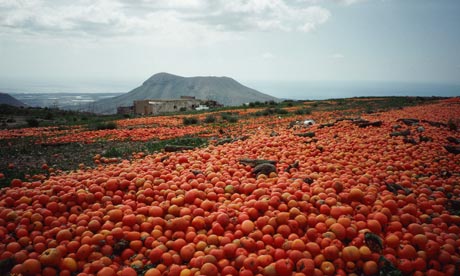When I first had this idea for a PhD topic I was pretty excited about it. Now I'm at that natural point, which occurs early on in any thesis, of wondering what the hell I'm doing. Defining my topic is tricky. I want to look at free food, at food activism, at food democratisation (what does that mean?)... what's all this about food sovereignty? I've come across twenty or so books published in the last three or four years with this in the title... and pretty much nothing on food democratisation.
Before I go completely insane and words stop having any coherent meaning at all I need to re-capture that excitement. What was it that inspired me? Who do I want to interview? What is it, particularly about 'free food' - outside of the monetary system that is so special when there's lots of really neat local ventures that use ordinary money that I could also be tempted to look into?
Kaiwhenua organics down the road, Mike who sells his organic milk raw and Aaryn who bakes sourdough bread in the traditional wood-powered bakers oven he built himself would all make really awesome case studies, and there's no reason why I couldn't write about them in the future. But I probably need to stick to the 'free-food' concept lest my thesis becomes too sprawling.
So what is free food? Although I don't like the sentiment of they saying "There's no such thing as a free lunch", I agree that nothing is really free, that is, everything is interconnected. Food has to be produced by someone/something drawing resources from somewhere else - even wild foraged food is produced within and by its eco-system. I want to focus on food outside of the monetary system, but community garderners may spend money on garden supplies. Even freegans subsisting entirely out of supermarket dumpsters are likely to use money for petrol get to the dumpsters - if they're car-free they may need bike repairs - there are very few people in industrialised capitalist society that don't use money at all.
I want to focus on practices that either generate food (largely) outside of the corporate food system and aren't bought or sold using conventional currency or that glean food that would otherwise be wasted, and, therefore, do not contribute to the corporate food system. I'm interested in concepts such as abundance, scarcity, freedom, community and participation - and I'm interested in what people involved in this sort of thing think and their lived experiences.
Well, that clarifies things a bit. I suppose, in looking at the literature, there's not much written specifically on this topic - especially in New Zealand - and so everything I'm reading is sending me in a slightly different direction which makes my head spin and my brain turn to jelly. Maybe it's time to invest in some ginkgo tea - or better yet - find a ginkgo tree and forage.
Before I go completely insane and words stop having any coherent meaning at all I need to re-capture that excitement. What was it that inspired me? Who do I want to interview? What is it, particularly about 'free food' - outside of the monetary system that is so special when there's lots of really neat local ventures that use ordinary money that I could also be tempted to look into?
Kaiwhenua organics down the road, Mike who sells his organic milk raw and Aaryn who bakes sourdough bread in the traditional wood-powered bakers oven he built himself would all make really awesome case studies, and there's no reason why I couldn't write about them in the future. But I probably need to stick to the 'free-food' concept lest my thesis becomes too sprawling.
So what is free food? Although I don't like the sentiment of they saying "There's no such thing as a free lunch", I agree that nothing is really free, that is, everything is interconnected. Food has to be produced by someone/something drawing resources from somewhere else - even wild foraged food is produced within and by its eco-system. I want to focus on food outside of the monetary system, but community garderners may spend money on garden supplies. Even freegans subsisting entirely out of supermarket dumpsters are likely to use money for petrol get to the dumpsters - if they're car-free they may need bike repairs - there are very few people in industrialised capitalist society that don't use money at all.
I want to focus on practices that either generate food (largely) outside of the corporate food system and aren't bought or sold using conventional currency or that glean food that would otherwise be wasted, and, therefore, do not contribute to the corporate food system. I'm interested in concepts such as abundance, scarcity, freedom, community and participation - and I'm interested in what people involved in this sort of thing think and their lived experiences.
Well, that clarifies things a bit. I suppose, in looking at the literature, there's not much written specifically on this topic - especially in New Zealand - and so everything I'm reading is sending me in a slightly different direction which makes my head spin and my brain turn to jelly. Maybe it's time to invest in some ginkgo tea - or better yet - find a ginkgo tree and forage.




